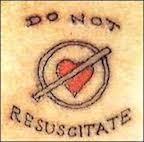Healthcare providers
often find themselves immersed in making ethical decisions about their patients' lives. For example, emergency physicians encounter patients who
have attempted suicide. These physicians may be faced with the dilemma of either honoring patients' DNR requests or intervening to
reverse the effects of potentially fatal suicides. Because terminally ill individuals have a right to refuse life-sustaining treatment by
signing a do-not-resuscitate (DNR) order, should their DNR requests be withheld if they attempt suicide? What should doctors do?
These are doctors' options regarding DNR and attempted suicide:
1) Should doctors presume that patients who attempt suicide lack the capacity to make that
decision due to acute mental illness and not honor these patients' requests not to
be resuscitated? This could reverse the effects of attempted suicides.
2) Should doctors presume that competent patients have reasonable preferences to not be forced to live
in unbearable, terminally ill conditions?
States that do not have legislation allowing physicians to assist in dying have physicians who struggle with these decisions on a case-by-case basis. Some physicians say
that patients have a right to refuse life-sustaining treatment when there is limited life expectancy and no concern that the patients have psychiatric illness as the primary cause of suicidal actions. What do you say?
Frances Shani Parker, Author
Becoming Dead Right: A Hospice Volunteer
in Urban Nursing Homes is available in paperback and e-book
editions in America and other countries at online and offline booksellers.

No comments:
Post a Comment